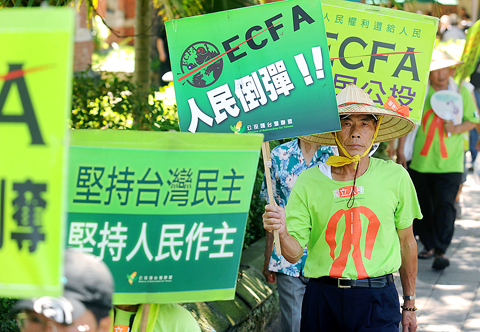An industrial economics expert yesterday criticized government comments that the cross-strait Economic Cooperation Framework Agreement (ECFA) would benefit the grassroots, saying that Taiwan’s “early harvest” list under the ECFA was problematic.
National Central University Institute of Industrial Economics professor Liu Ching-lung (劉錦龍) said he had found five serious problems after a closer look at the 539 items on Taiwan’s “early harvest” list.
The list includes “goods that export to China in small quantity,” “goods that import from China in small quantity,” “Taiwanese goods that have great market share in China,” “goods that have been granted low import tax by China” and “goods whose market has been dominated by Chinese exports.”

PHOTO: LIAO CHEN-HUEI, TAIPEI TIMES
While the administration of President Ma Ying-jeou (馬英九) said the list would spur Taiwanese exports, Liu said that China already dominates the market of up to 225 items on the list, with their export volume reaching more than US$100 million last year. Liu said that China’s export volume of 26 items on the list had hit US$1 billion last year. In other words, Liu said, China not only manufactures those products, but also enjoys a strong competitive advantage in their export markets.
In terms of items that the Ma administration said would benefit local small and medium-sized enterprises, Liu said that China’s export volumes in three bicycle-related products had reached US$1.4 billion, US$250 million and US$190 million respectively, and that China’s export volumes of two kinds of automobile parts had reached US$2.5 billion and US$1.73 billion.
The export volume of cotton towels from China had hit US$920 million, while the export of other Chinese towels had reached US$990 million, Liu said, adding that China’s other items, including ovens, irons, toasters and golf products, also enjoyed a competitive edge.
China has slowly dropped its policy of encouraging exports, Liu said, lifting its export rebates and reevaluating the currency exchange rate.
Under these circumstance, Taiwanese businesses will find it difficult to compete with their Chinese counterparts if Chinese products are sold to the domestic market, Liu said.
Taiwan’s small and medium-sized enterprises will not benefit from the tariff breaks stipulated in the ECFA, while the Ma administration’s promise to take care of them is an empty promise, he said.

The High Prosecutors’ Office yesterday withdrew an appeal against the acquittal of a former bank manager 22 years after his death, marking Taiwan’s first instance of prosecutors rendering posthumous justice to a wrongfully convicted defendant. Chu Ching-en (諸慶恩) — formerly a manager at the Taipei branch of BNP Paribas — was in 1999 accused by Weng Mao-chung (翁茂鍾), then-president of Chia Her Industrial Co, of forging a request for a fixed deposit of US$10 million by I-Hwa Industrial Co, a subsidiary of Chia Her, which was used as collateral. Chu was ruled not guilty in the first trial, but was found guilty

DEADLOCK: As the commission is unable to forum a quorum to review license renewal applications, the channel operators are not at fault and can air past their license date The National Communications Commission (NCC) yesterday said that the Public Television Service (PTS) and 36 other television and radio broadcasters could continue airing, despite the commission’s inability to meet a quorum to review their license renewal applications. The licenses of PTS and the other channels are set to expire between this month and June. The National Communications Commission Organization Act (國家通訊傳播委員會組織法) stipulates that the commission must meet the mandated quorum of four to hold a valid meeting. The seven-member commission currently has only three commissioners. “We have informed the channel operators of the progress we have made in reviewing their license renewal applications, and

‘DENIAL DEFENSE’: The US would increase its military presence with uncrewed ships, and submarines, while boosting defense in the Indo-Pacific, a Pete Hegseth memo said The US is reorienting its military strategy to focus primarily on deterring a potential Chinese invasion of Taiwan, a memo signed by US Secretary of Defense Pete Hegseth showed. The memo also called on Taiwan to increase its defense spending. The document, known as the “Interim National Defense Strategic Guidance,” was distributed this month and detailed the national defense plans of US President Donald Trump’s administration, an article in the Washington Post said on Saturday. It outlines how the US can prepare for a potential war with China and defend itself from threats in the “near abroad,” including Greenland and the Panama

Taiwan People’s Party (TPP) Chairman Huang Kuo-chang (黃國昌) yesterday appealed to the authorities to release former Taipei mayor Ko Wen-je (柯文哲) from pretrial detention amid conflicting reports about his health. The TPP at a news conference on Thursday said that Ko should be released to a hospital for treatment, adding that he has blood in his urine and had spells of pain and nausea followed by vomiting over the past three months. Hsieh Yen-yau (謝炎堯), a retired professor of internal medicine and Ko’s former teacher, said that Ko’s symptoms aligned with gallstones, kidney inflammation and potentially dangerous heart conditions. Ko, charged with